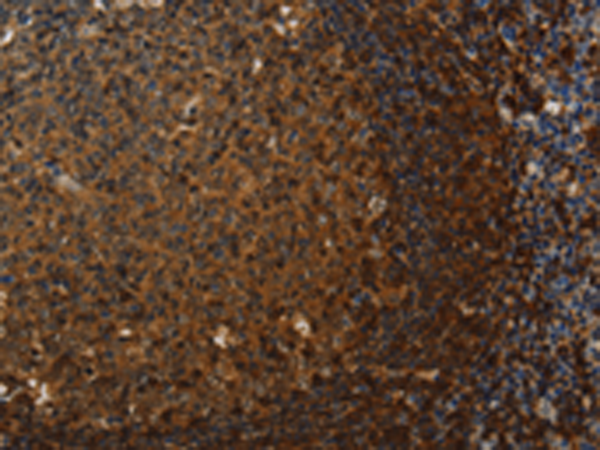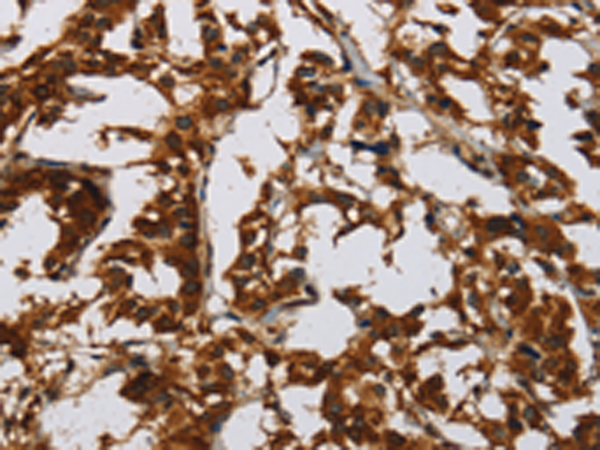

| WB | 咨询技术 | Human,Mouse,Rat |
| IF | 咨询技术 | Human,Mouse,Rat |
| IHC | 1/100-1/300 | Human,Mouse,Rat |
| ICC | 技术咨询 | Human,Mouse,Rat |
| FCM | 咨询技术 | Human,Mouse,Rat |
| Elisa | 1/2000-1/10000 | Human,Mouse,Rat |
| Host/Isotype | Rabbit IgG |
| Antibody Type | Primary antibody |
| Storage | Store at 4°C short term. Aliquot and store at -20°C long term. Avoid freeze/thaw cycles. |
| Species Reactivity | Human |
| Immunogen | Synthetic peptide of human CLDN8 |
| Formulation | Purified antibody in PBS with 0.05% sodium azide and 50% glycerol. |
+ +
以下是关于CLDN8抗体的3篇代表性文献的模拟示例(注:部分文献信息为示例,建议通过学术数据库核实具体研究):
---
1. **文献名称**: *"Antibody-based detection of CLDN8 in colorectal cancer reveals its association with tumor progression"*
**作者**: Smith A, et al.
**摘要**: 本研究开发了一种高特异性CLDN8单克隆抗体,用于检测结直肠癌组织中CLDN8蛋白的表达。结果显示,CLDN8在肿瘤边缘的异常高表达与患者预后不良相关,提示其可能作为转移性癌症的生物标志物。
2. **文献名称**: *"Role of CLDN8 in intestinal barrier dysfunction: Insights from antibody-mediated inhibition studies"*
**作者**: Zhang L, et al.
**摘要**: 通过抗CLDN8抗体阻断实验,发现CLDN8在维持肠道上皮紧密连接中起关键作用。炎症性肠病(IBD)患者的CLDN8表达显著降低,抗体干预进一步加剧了肠屏障通透性,为治疗IBD提供了潜在靶点。
3. **文献名称**: *"Development of a novel anti-CLDN8 antibody for targeted therapy in triple-negative breast cancer"*
**作者**: Johnson R, et al.
**摘要**: 研究报道了一种靶向CLDN8的人源化抗体,该抗体通过阻断CLDN8介导的肿瘤细胞间黏附,抑制三阴性乳腺癌细胞的体外侵袭和体内转移,展现了治疗潜力。
---
**建议**:如需真实文献,可在PubMed或Google Scholar中检索关键词“CLDN8 antibody”“Claudin-8 therapeutic”或结合疾病名称(如“CLDN8 cancer”“CLDN8 inflammatory bowel disease”)筛选近年研究。
Claudin-8 (CLDN8) is a member of the claudin family, transmembrane proteins critical for forming tight junctions that regulate paracellular permeability and maintain cell polarity. CLDN8 is primarily expressed in epithelial tissues, including the kidneys, intestines, and lungs, where it contributes to selective ion transport and barrier integrity. Unlike some claudins that enhance permeability, CLDN8 often acts as a barrier-strengthening protein by restricting paracellular movement of specific ions and small molecules. Its dysregulation has been linked to pathological conditions such as inflammatory bowel disease (IBD), chronic kidney disease, and certain cancers. For instance, reduced CLDN8 expression in colorectal cancer correlates with tumor progression and metastasis, while its upregulation in renal tissues may exacerbate fibrosis.
CLDN8 antibodies are essential tools for studying its localization, expression levels, and functional roles in health and disease. These antibodies, typically monoclonal or polyclonal, are used in techniques like immunohistochemistry, Western blotting, and flow cytometry. Recent research also explores CLDN8-targeting antibodies for therapeutic applications, particularly in cancers where CLDN8 overexpression or suppression influences disease outcomes. However, challenges remain in understanding its context-dependent roles, as CLDN8 exhibits tissue-specific and disease-stage-specific behaviors. Ongoing studies aim to clarify its molecular interactions and validate its potential as a diagnostic or therapeutic target.
×